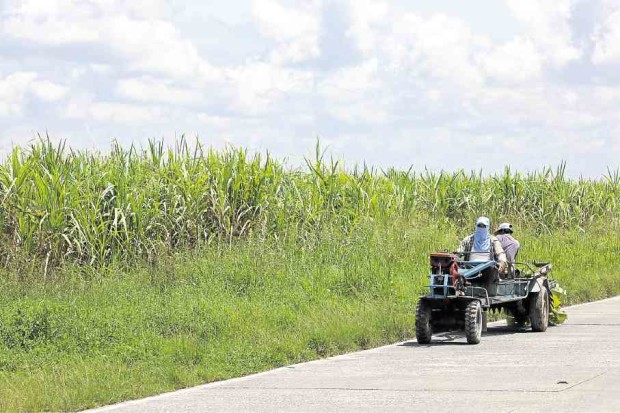‘Sacada’ in Luisita tagged case of human trafficking

Rows of sugarcane line roads inside Hacienda Luisita, an estate owned by the family of former President Benigno Aquino and now embroiled in the alleged trafficking of workers from Bukidnon province. —NIÑO JESUS ORBETA
CAGAYAN DE ORO CITY—Workers who fled allegedly slave-like conditions in Hacienda Luisita are filing charges of human trafficking against their recruiter and the company that runs a sugar mill in the estate owned by the family of former President Aquino, according to a union of workers in Luisita.
Danilo Ramos, secretary general of Unyon ng mga Manggagawa sa Agrikultura (UMA), said in a statement that the group would sue the workers’ recruiter, Greenhand Labor Service Cooperative (GLSC), Agrikulto Inc. and Central Azucarera de Tarlac (CAT).
GLSC had recruited the workers for sugar plantations in Luisita.
The criminal cases are separate from a complaint that the workers had filed at the National Labor Relations Commission (NLRC).
More than a thousand workers, most of them coming from Bukidnon and the neighboring provinces of Davao, Cotabato, Misamis Oriental and Lanao del Sur, staged a protest rally at the Press Freedom Monument here to demand justice for abuses that they suffered in Luisita.
Article continues after this advertisementAccording to Ramos, GLSC recruited the workers for Agrikulto Inc., a company that Ramos said had been bought by CAT, although CAT had repeatedly denied it.
Article continues after this advertisementThe workers said they were enticed by what GLSC called the “Tarlac Package,” which included among others, a daily wage of P450 on top of benefits and free provisions. The package did not materialize.
Mario Member, a sacada or farm hand from Bukidnon hired by GLSC, said GLSC presented to workers a contract which promised free food, rice, medicines and housing and other benefits like membership in the Social Security System, PhilHealth and Pag-Ibig.
Dozens of farm hands from Bukidnon applied and were hired.
Too good to be true
Mario Magnaran, 58, a contractual worker at a large agri-company in Bukidnon before he was recruited, said he was also attracted by the Tarlac Package. He said he was dismayed upon learning that the offer was too good to be true.
He said he and other workers were given P2,500 in cash advance in the first month. He was able to send only P1,500 to his family, though, as P1,000 had been deducted for items given to the workers, like kitchenware.
The workers, he said, lived in a house about two hours away by foot from the plantation inside Luisita in Barangay Mapalacsiao, Tarlac province. The distance forced them to rise as early as 3 a.m. to go to the sugarcane field.
When it was clear that the management had no plan of fulfilling its obligation to give them the Tarlac Package, Magnaran said the workers decided to escape. Workers from other areas did the same.
Magnaran was among 36 workers from Bukidnon, four of them minors, who packed their bags and left the Luisita estate on Dec. 28.
The sacadas earlier filed labor complaints against the officials of GLSC and its principals at the NLRC in San Fernando City, Pampanga province.
“The (sacadas) were subjected to the worst forms of exploitation and contractualization in Hacienda Luisita,” UMA’s Ramos said in the statement.
He said the Department of Labor and Employment Order No. 168, which practically allowed sugarcane plantations to hire sacadas, legitimized the practice, aggravating the condition of workers.
He called the practice “modern-day slavery.”
“There is even an order specifically for sacadas that institutionalizes the oppressive ’pakyaw’ wages or group rates, and allows the employer to oblige sacadas to pay for work tools and facilities,” Ramos said.
Magnaran said the workers stayed for a few days at the Department of Agrarian Reform building in Quezon City before leaving for Cagayan de Oro and Bukidnon on Wednesday. —JIGGER J. JERUSALEM